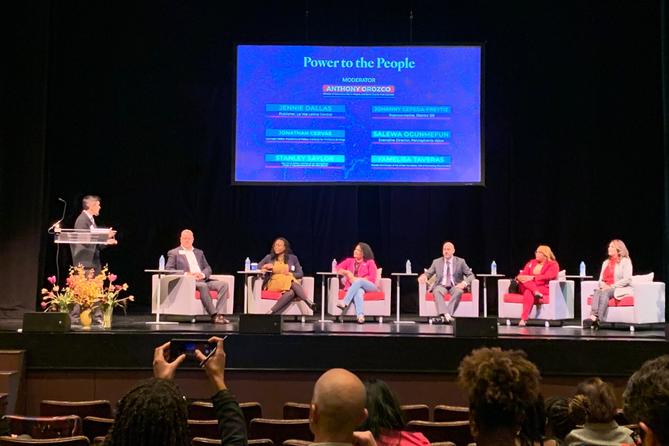Spotlight PA is an independent, nonpartisan, and nonprofit newsroom producing investigative and public-service journalism that holds the powerful to account and drives positive change in Pennsylvania. Sign up for our free newsletters.
HARRISBURG — With critical judicial elections weeks away and a presidential race on the horizon, business leaders, state lawmakers, and voting rights advocates gathered to discuss how to engage more communities in government and politics.
The event, “Path to Equity,” was hosted by Color & Culture, a Harrisburg-based marketing agency focused on reaching marginalized communities, and the nonprofit news organization Spotlight PA. It focused “on the state's rapidly growing communities of color, why they are not yet proportionally represented in positions of power, what obstacles exist in terms of their engagement, and the vital importance journalism plays in this equation,” its organizers said in an announcement.
“Pennsylvania has long been a battleground state and will continue to be so in future election cycles,” Color & Culture CEO George Fernandez said Wednesday at the Whitaker Center in Harrisburg. “Historically, marginalized voters are instrumental in determining the results in both presidential and midterm elections. And that's why we came here together today.”
The event featured a panel of advisors to Democratic Gov. Josh Shapiro, all of whom serve as executive directors of commissions that focus on African American, LGBTQ, Asian American, and women’s affairs.
The commissions, established by different governors through executive orders over the years, hear feedback from their specific communities and advise the governor's policy staff and agencies on solutions.
The advisors said that meeting people where they are, breaking down complicated government jargon into useful information, and getting results are top priorities to increase engagement.
“Just having Gov. Shapiro utilize social media so much more, I think that's the perfect way to mobilize the next generation of voters, and, honestly, the next generation of who's going to run our commonwealth,” said Moriah Hathaway, executive director of the Commission on Women.
Errin Haines — editor-at-large for the 19th, a news outlet focused on serving women and LGBTQ people — said in a keynote address that local journalism is an important way of connecting communities to power.
“Telling the full truth about where we have been shows us the path for equity, for how we can tell the full truth about where we are now, and where we may be headed in the future,” Haines said.
“And it takes a diverse press, representative of the communities that they are tasked with covering, to leave behind the most honest and accurate record of who and where we are as a commonwealth.”
The event closed with a six-member panel featuring state legislative candidates from both major parties, a voting rights advocate, and a redistricting expert. They discussed how Pennsylvania’s legislative maps, redrawn in 2021 and 2022 following the release of new population numbers, helped or hindered people of color running for office.
The state House and Senate maps were redrawn by the Legislative Reapportionment Commission, a five-person panel composed of the top General Assembly leaders and an independent chair. The final version of the lower chamber’s map created more districts that could be won by building a coalition of voters of different races and ethnicities, its supporters said.
That did come to pass, as voters elected the most diverse General Assembly ever last year while flipping the chamber from Republican control to a slim Democratic majority.
However, its critics argued that the map accomplished this by diluting and splitting many of the commonwealth’s smaller, diverse cities such as Allentown, Harrisburg, and Lancaster, particularly at the expense of Latino voters.
Former GOP legislative leader Stan Saylor made that argument, pointing to races in which Latino candidates lost in areas where districts represented by white incumbents were redrawn.
“Both parties, Democrats and Republicans, always play games with the maps. That just naturally is going to happen in politics, there's no perfect world,” Saylor said. “But when you take two candidates who have announced, who are minorities, and take them out so the two white guys can win, that's something wrong with the maps.”
Salewa Ogunmefun — executive director of Pennsylvania Voice, a group that advocates for equitable representation in state government — countered that packing communities of color into majority-minority districts can also dilute their overall power in a state legislature.
Additionally, she argued that the legislature should operate more transparently and in a way that meets everyday people where they are by addressing important issues like education funding or voting rights.
“They make these decisions. They can make them different at any time,” Ogunmefun said.
The makeup of the districts isn’t the only obstacle for candidates of color.
State Rep. Johanny Cepeda-Freytiz (D., Berks) said that as a small business owner and mother, jumping into public service was a nearly impossible hurdle while keeping a roof over her family’s head and food on the table. That, she argued, locks out anyone without access to personal wealth.
“How do I provide and run for office at the same time?” Cepeda-Freytiz said. “Something needs to change. How we campaign needs to change.”
BEFORE YOU GO… If you learned something from this article, pay it forward and contribute to Spotlight PA at spotlightpa.org/donate. Spotlight PA is funded by foundations and readers like you who are committed to accountability journalism that gets results.

